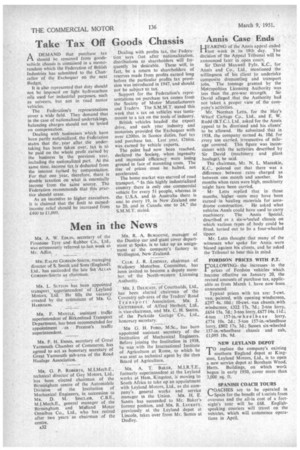Take Tax Off Goods Chassis
Page 34

If you've noticed an error in this article please click here to report it so we can fix it.
ADEMAND that purchase tax should be removed from goodsvehicle chassis is contained in a memorandum which the Federation of British Industries has submitted to the Chancellor of the Exchequer on the next Budget.
It is also represented that duty should not be imposed on light hydrocarbon oils used for industrial purposes, such as solvents, but not in road motor vehicles.
The Federation's representations cover a wide field. They demand that in the case of nationalized undertakings, balancing charges should not be levied on compensation. _ ,
Dealing with' businesses which have been partly nationalized, the Federation states that the, year r after, the undertaking has been taken over, tax is to be paid on the whole profit earned by the business in the previous year, including the nationalized part. At the same time, income tax is deducted from the interest earned by compensation. For that one year, therefore, there is double taxation on what is essentially income from the same 'source. The Federation recommends that this practice should cease.
As an incentive to higher executives. it is claimed that the limit to earnedincome relief should be increased from £400 to £1,000. Dealing with profits tax, the Federation says that after nationalization. distributions to shareholders will frequently be desirable. These will, in fact, be a return to shareholders of reserves made from profits earned long before the particular profits tax provision was introduced in 1947, and should not be subject to tax.
Support for the Federation's representations on purchase tax comes from the Society of Motor Manufacturers and Traders The S.M.M.T. stated this week that a tax on vehicles was tantamount to a tax on the tools of industry.
British vehicles headed the export drive, and each year industry and motorists provided the Exchequer with over £200m. in licence duties, fuel tax and purchase tax. Last year, £266m. was earned by vehicle exports.
The point had now been reached, declared the Society, when ingenuity and increased 'efficiency were losing ground in face of mounting costs. The rise of prices must be halted, not accelerated.
The home market was starved of road transport. "In this highly industrialized country there is only one commercial vehicle for every 51 people, whereas in the U.S.A. and in Australia there is one to every 19, in New Zealand one to 20, and in Canada one to 24," the S.M.M.T. stated.




















































































